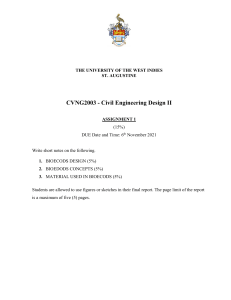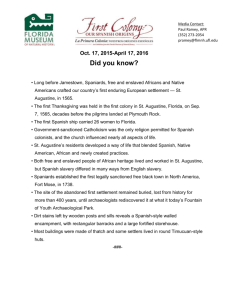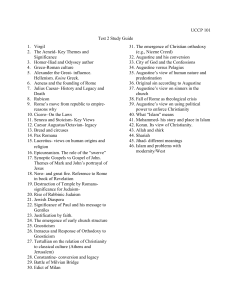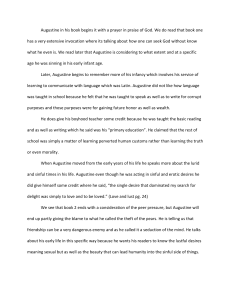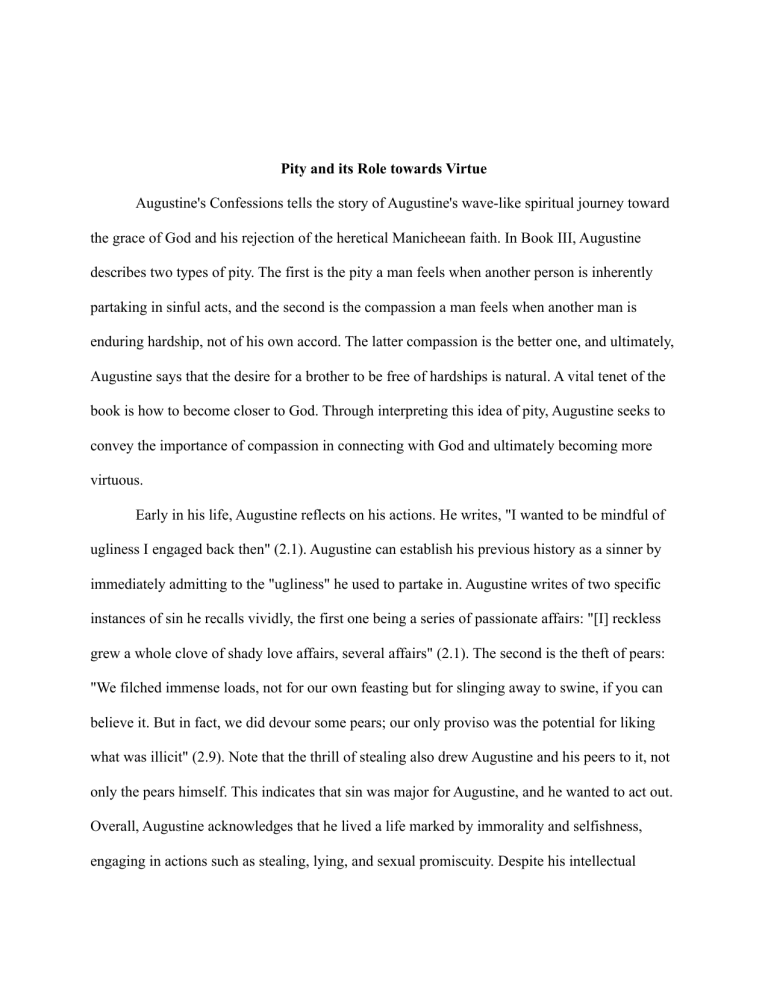
Pity and its Role towards Virtue Augustine's Confessions tells the story of Augustine's wave-like spiritual journey toward the grace of God and his rejection of the heretical Manicheean faith. In Book III, Augustine describes two types of pity. The first is the pity a man feels when another person is inherently partaking in sinful acts, and the second is the compassion a man feels when another man is enduring hardship, not of his own accord. The latter compassion is the better one, and ultimately, Augustine says that the desire for a brother to be free of hardships is natural. A vital tenet of the book is how to become closer to God. Through interpreting this idea of pity, Augustine seeks to convey the importance of compassion in connecting with God and ultimately becoming more virtuous. Early in his life, Augustine reflects on his actions. He writes, "I wanted to be mindful of ugliness I engaged back then" (2.1). Augustine can establish his previous history as a sinner by immediately admitting to the "ugliness" he used to partake in. Augustine writes of two specific instances of sin he recalls vividly, the first one being a series of passionate affairs: "[I] reckless grew a whole clove of shady love affairs, several affairs" (2.1). The second is the theft of pears: "We filched immense loads, not for our own feasting but for slinging away to swine, if you can believe it. But in fact, we did devour some pears; our only proviso was the potential for liking what was illicit" (2.9). Note that the thrill of stealing also drew Augustine and his peers to it, not only the pears himself. This indicates that sin was major for Augustine, and he wanted to act out. Overall, Augustine acknowledges that he lived a life marked by immorality and selfishness, engaging in actions such as stealing, lying, and sexual promiscuity. Despite his intellectual pursuits, Augustine struggled with a deep sense of restlessness and dissatisfaction, which led to his desire to act out. These actions required Augustine to understand why sin is to be avoided and therefore feel a closer connection to God that establishes a better way to feel compassion for others. Augustine reflects on his journey and recognises that sin creates a barrier between the individual and God. Augustine writes, "sin is committed when an unchecked leaning toward these, given that they are the lowest order of good things, causes a desertion of the better and the highest, namely you, God our Master, and your truth and your law" (2.10). Augustine argues that true happiness and fulfilment can only be found in a close relationship with God and that sin hinders this relationship. He emphasizes the need to strive for virtuous living constantly and to turn away from sin through prayer, humility, and dependence on God's grace. Augustine recognizes that this is a lifelong process and that one can never wholly avoid sin, but he encourages the pursuit of a virtuous life as a way to grow closer to God. One way of achieving this closer relationship with God is through compassion and pity. Augustine then argues that compassion motivates one to help others in their suffering and to work towards justice and peace in the world. In Book III, he says that "Now, in contrast, I pity more the man who enjoys himself in indecency than the one who endures hardships in the curtailment of an indulgence that destroys him and in the loss of his lamentable "happiness." (3.3). Augustine is acknowledging that he feels more compassion for the man who takes pride in sin rather than the man who has to endure hardships, not of his choice. He also acknowledges that without God's grace, one's capacity for compassion is limited and imperfect, but with God's help, one can grow in compassion and love for others. It is the capacity for compassion that makes a human closer to God and, therefore, more virtuous. Augustine emphasizes that showing compassion to others is an essential part of living a virtuous and fulfilling life and a crucial aspect of one's relationship with God. Early in the book, Augustine establishes that humans were made in God's image, and in Book IX, he says that God is "compassionate" (9.1). Therefore it is understood that compassionate people are closer to God because God is compassionate. However, Augustine also delineates two types of pity: a pity for the unlucky and a pity for the intentional sinners, of which he says that pity for the unlucky is the "true pity". Augustine writes, "This latter is for certain the truer pity, but here there's no feeling of fun in the pain" (3.3). Augustine believes that there is no joy when feeling compassion for someone's unfortunate state. St. Augustine is saying that the virtuous form of pity is indeed the "truer" form of pity, but it doesn't come with the satisfaction or enjoyment that one might get from feeling pity in a vicious sense. The virtuous form of pity is characterised by compassion for others and a desire to relieve their suffering without any expectation of personal gain or satisfaction. This form of pity is a purer, nobler, and more selfless form of sympathy. Augustine emphasises that true happiness and fulfilment can only be found in this virtuous form of pity, even though it may not bring immediate pleasure or enjoyment. Furthermore, the "person is esteemed for pitying someone in a dismal state, because it's love's duty to pity him. But the person who pities like a true brother would naturally prefer that there be nothing for him to pity" (3.3). The proper brotherly form of pity is rooted in love and the desire to alleviate suffering, not in the desire to receive recognition or admiration. Augustine emphasizes that the virtuous state of pity should come from a place of genuine love and concern rather than a desire for personal gain or recognition. This pity ultimately brings us closer to God because it pushes us to think beyond ourselves and be virtuous. Augustine describes how he was initially sinful in his life and that to be less evil, he had to be closer to God. He establishes how God is compassionate; therefore, being compassionate is also crucial to being closer to God. Therefore, the most righteous path is being human. However, compassion for those who are unlucky is the best virtue. By explaining how important integrity is, Augustine can convey the importance of God in living a virtuous life.
